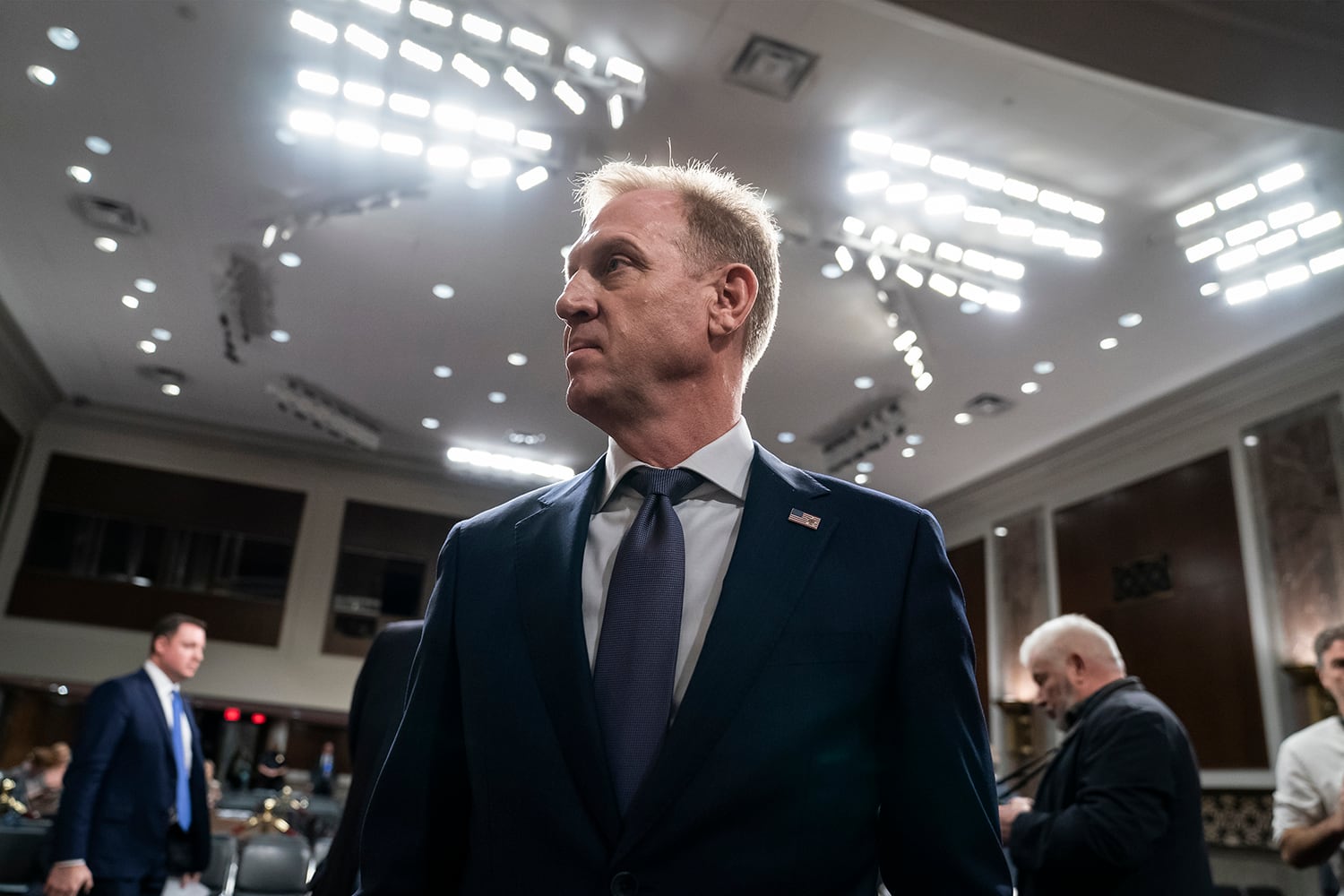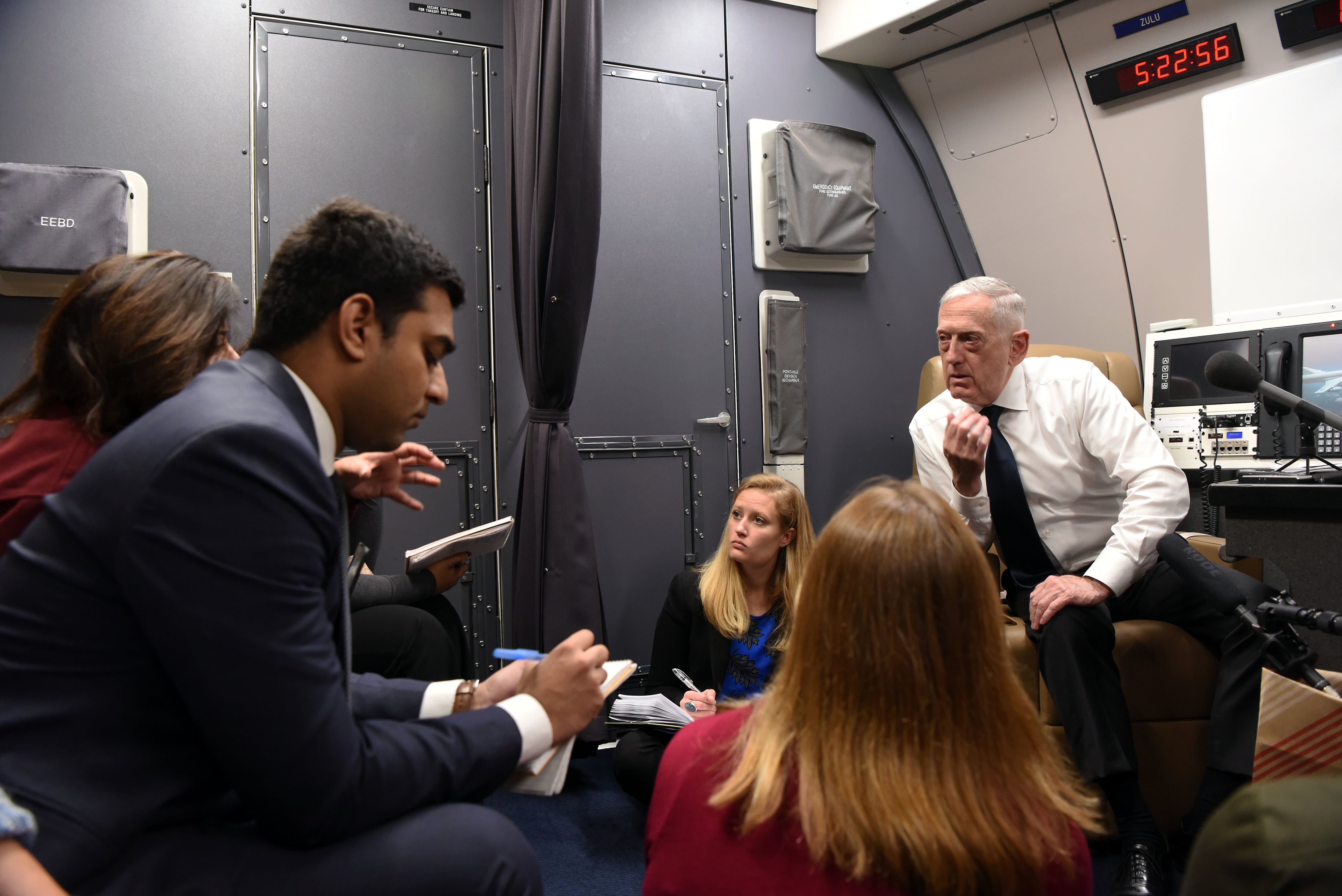WASHINGTON — In the 70 years before 2019, the Department of Defense had never gone more than two months without a permanent leader. Now, President Donald Trump’s administration is poised to double that wait.
The post formerly filled by Defense Secretary Jim Mattis has been open since Jan. 1, a leadership void that has drawn increasing concern among lawmakers.
Senate Armed Services Committee Chairman Jim Inhofe, R-Okla., has pressed the Trump administration repeatedly for quicker action on the vacancy, and he was among lawmakers of both parties who expressed frustration this week that no solution appears to be in sight.
“They are moving too slow, and I single out this nomination — who is secretary of defense — you’ve got to have somebody who is perceived to be a permanent person,” Inhofe said. “When you’re the secretary of defense, you’re handling life or death issues for other countries. They have to be sure they are talking with someone in charge.
“You’re not in charge if you’re acting, in my opinion.”
For weeks, rumors have swirled that acting Defense Secretary Patrick Shanahan may be formally nominated to fill that vacancy, but that move now appears stalled.
The White House’s delay in naming a new defense secretary nominee means the Pentagon is poised to pass the 90-day mark without a permanent leader next week. Even if a nominee is announced in coming days, that person likely won’t be confirmed before Memorial Day, given the complexity of the process.
And the lack of a new defense secretary is further complicating the filling of other key Pentagon leadership posts, including Heather Wilson’s replacement as Air Force secretary. Along with Shanahan, the deputy defense secretary and chief management officer posts are also currently manned by acting officials, and multiple undersecretary of defense and assistant secretary of defense posts have similar placeholders.
Inhofe said he heard concerns about the leadership vacuum from world leaders at an international security conference in Germany last month. World leaders see someone in an acting role, “as someone who they’re not sure they have to listen to,” said the Senate Foreign Relations Committee’s top Democrat, Sen. Bob Menendez, of New Jersey.
Other members of the Senate Armed Services Committee said they, too, worry about the message being sent by the administration.
“I would have liked to have seen a secdef by now, a permanent secdef, “ said Sen. Joni Ernst, R-Iowa, and chairwoman of the Emerging Threats and Capabilities Subcommittee. “I think it’s an important signal to send to our friend and allies, and our adversaries, that we take this seriously.”
RELATED

The lack of a Senate-confirmed leader can be a problem inside the Pentagon, said Sen. Thom Tillis, R-N.C., and chairman of the SASC Personnel Subcommittee.
“It’s credibility, it’s commitment, it’s an affirmation that the Congress is behind the leader of the agency,” Tillis said. “(The acting defense secretary) has a lot of the authorities, but it still means something to the people in the DoD.”
Earlier this week, House Armed Services Committee Chairman Rep. Adam Smith, D-Wash., joked that Shanahan is poised to become “acting chairman for life” if the Trump administration fails to move ahead with finding a permanent replacement for Mattis.
But the quip underscores real concerns from lawmakers as they enter one of the most contentious defense budget fights in years, but without the proper Pentagon leadership in place.
Shanahan, who served as Mattis’ second-in-command and has handled day-to-day operations for the department since Mattis’ departure, has been to Capitol Hill twice this month to defend Trump’s plan for a $750 billion defense budget in fiscal 2020, and had his unclear leadership status broached both times.
Inhofe has said he is “fine with our current acting secretary,” but also said that if Shanahan isn’t the president’s pick, Trump needs to move on already.
RELATED

“The president needs to make up his mind, send the message and whatever his decision is, it should be followed,” Inhofe said. “In the meantime, there has to be somebody out there.”
Inhofe said he has heard two other credible candidates floated, but would not identify them. Several Democrats have said they want a defense secretary like Mattis — known not only for his gravitas but also as a check on the president — but Inhofe suggested that may be an unattainable wish.
“I have to say that I can’t think of a higher bar (than Mattis),” Inhofe said. “We need to get someone who knows the job and is willing to do it. Right now, that’s one of the major considerations. There are a lot of people who don’t want to subject themselves to getting into this tough position, when there’s been so much controversy.”
Senate Armed Services Committee ranking member Jack Reed, D-R.I., echoed Inhofe’s call for prompt action on the post.
“We have to get a nomination from the president sooner rather than later because an acting status, regardless of who’s there, is not as effective in the department as a confirmed secretary,” he said.
“Anyone who’s in an acting capacity, people are wondering, ‘Will he be the nominee?’ And then, ‘Should we follow through with this initiative — if it’s the personal initiative of this individual — and how much energy should we put into it?’ That’s natural in any organization: ‘You’re acting? That’s nice, somebody’s coming after you.’”
RELATED

If the president were to nominate Shanahan in coming days — a situation Inhofe has said recently is doubtful, given the past delays — there’s little evidence his time in the job would ensure an easy confirmation process.
Reed and other Democrats felt the administration cannot in good conscience name Shanahan while he is under investigation by the Department of Defense Inspector General. Last week, the watchdog agency launched a probe into reports that Shanahan disparaged competing defense companies to the potential benefit of his former firm, Boeing.
“I would think the president would want to know the outcome of that investigation before he is nominated,” Sen. Richard Blumenthal, D-Conn. “There are a lot of very able people who could be secretary of defense, and the administration may choose one of them instead.”
Ernst said she likes Shanahan “but I would want to go back and vet again. Being the secretary of defense comes with some crucial decision making, and especially when it comes to contracts, I want to make sure that everything is good to go.”
Joe Gould was the senior Pentagon reporter for Defense News, covering the intersection of national security policy, politics and the defense industry. He had previously served as Congress reporter.
Leo covers Congress, Veterans Affairs and the White House for Military Times. He has covered Washington, D.C. since 2004, focusing on military personnel and veterans policies. His work has earned numerous honors, including a 2009 Polk award, a 2010 National Headliner Award, the IAVA Leadership in Journalism award and the VFW News Media award.





